Movie Review
 |
 |
 |
 |
 |
 |
 |
The Lion King: Tribalism in a Virtual Reality
Salwa Bachar
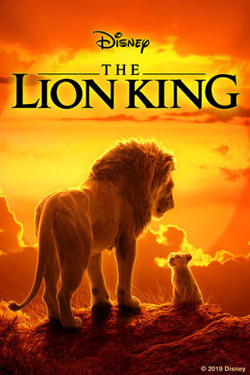
In order to apply the R-CR criteria (R-CR = Revolution & Counter-Revolution) to this movie, we must ask: What is the doctrine behind it? And: Is there anything in it that is opposed to the Faith and Catholic customs?
John Kani, the actor who did the voice of Rafiki in the 2019 version, affirmed in an interview: “When you say to someone, ‘What is this Lion King about?’ It’s about humanity. It’s about us.”
Fitting in with many revolutionary tendencies in fashion today, The Lion King promotes the idea of returning to our supposed “roots,” glorifying primitive humanity. In other words, it promotes paganism and indigenous tribalism.
Circle of Life: A tenet of African pagan religions
The movie’s central theme is summarized by its opening song “Circle of Life.” Mufasa, the lion-king of the Pride Lands, teaches his young cub-prince Simba about this circle of life:
“Everything exists together in a delicate balance... When we die, our bodies become the grass, and the antelope eat the grass, [and the lions eat the antelope], and so we are all connected in the Great Circle of Life.”
Later on, after Mufasa has died, Rafiki the babboon shaman (yes, the paganism is blatant) tells grown-up Simba that Mufasa is not dead, that “Mufasa lives in you.” Mufasa appears to him in a heavenly vision, where he tells Simba: “You must take your place in the Circle of Life.”
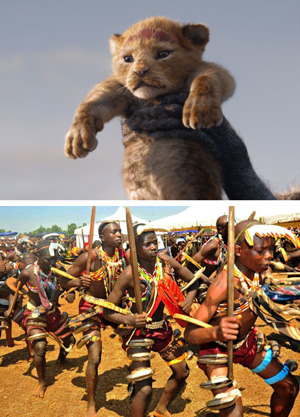
African paganism is based on ancestor worship
“The traditional African belief system is also referred to as ancestor worship. Unlike the Christian and Western ways of thinking, the premise for ancestor worship is based on an understanding that the life course is cyclical and not linear. Those who are dead, though not physically seen, are alive in a different world and can reincarnate in new births.” (1)
The dead Mufasa lives in Simba, and thus Simba must take his place in the circle of life...
Is life cyclical? No, each life is individual; the Faith teaches us that man has one goal, and that is Heaven. Man is born, lives and dies; after death he is judged by God, and, based on how he lived, he continues to live on forever either in Heaven or Hell (with Purgatory being a preparation for Heaven). There is no “cycle” involved.
So, when viewers watch the movie thinking they are seeing an innocent Disney story, they are actually being groomed to accept ideas coming from indigenous African paganism, which is obviously opposed to the Catholic Faith. At the very least the viewer becomes sympathetic to this belief system. This empathy with Paganism is dangerous for a Catholic, since the Faith teaches us that there is no salvation outside the Catholic Church and that “the gods of the Gentiles are devils.” (Ps 95:5)
Virtual reality: Blurring the line between real & unreal
The tool used in this movie to bring viewers to accept Tribalism is virtual reality.
The whole movie (except for one shot) was generated by computers and brought into virtual reality (VR) for filming, according to director Jon Favreau in one interview (see the 8:42 mark). He boasts in another interview that “this was the first time that virtual production was ever used” (see 8:00 mark here).
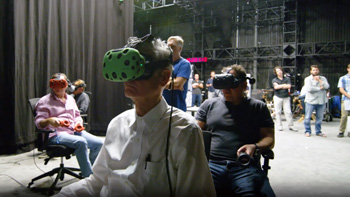
Disney's production team at work in virtual reality
It is safe to say that virtual reality works to break a person’s psychology, since it blurs the lines between what is real and what is not. By extension, it does harm to the soul in a different way: You become immersed in a reality where there is no God, no Faith, no Cross...
If this is what VR does to adults, what effect could it have on young people with malleable minds? One is left to imagine.
Ecology, Communism & Tribalism
In yet another interview (see the 4:03 mark), the director Favreau mentions that the movie features the northern white rhino, a species that is functionally extinct. He explains: “Hopefully having these images [will help children] develop a relationship [with the rhinos] and feel a sense of responsibility [to protect them].”
We see more of the same ecology propaganda: Protect our earth, save the rhinos, stop using plastic... Tendentially speaking, this leads to the earth worship that we are now seeing in the wake of the Amazon Synod, with “Mother Earth” being the center of everything.
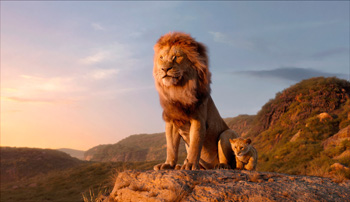
Mufasa teaches Simba Communism
The main goal of Communism can be summarized as the abolition of private property. (see chapter 2 of Marx’s Communist Manifesto, § 13) This abolition of private property, Marx reasons (§§ 53 and 55), leads to “[the abolition] of countries and nationality. The working men have no country. We cannot take from them what they have not got... the supremacy of the proletariat will cause [national differences] to vanish still faster. United action [not hindered by national borders]... is one of the first conditions for the emancipation of the proletariat.”
So, with the kingdom “belonging to no one,” we have a poignant reference to Communism, an ideology diametrically opposed to the social doctrine of the Church. There is also an obvious implication of Tribalism – radical Communism (also called Structuralism) taken to its final theoretical consequences – where all the animals live together in harmony only separated by tribes led by a shaman, and the land belongs to everyone, no borders are necessary.
Libertarian lack of decorum
Communism leads to hippie-ism, as A.S. Guimarães explains here. At one point, Simba ends up in a jungle utopia with Timon and Pumbaa, a male meerkat and male warthog. In this jungle utopia, every animal is free to roam and eat whatever he likes, except each other. Timon and Pumbaa’s way of life – with “no rules or responsibilities” – is an application of their existential hippie mentality. They explain to Simba: “Life is not a circle; it’s a line, a meaningless line of indifference, and one day we’ll reach the end and that’ll be it. And then, line over. Nothing.”
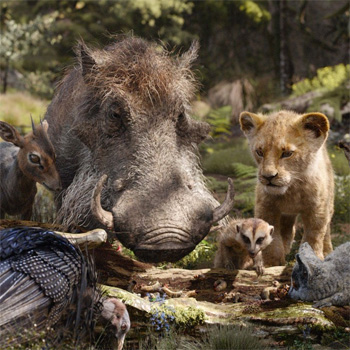
The animals eat whatever they like -
except each other...
This kind of thinking is nefarious poison for the mind. It encourages the viewer to see social rules and order – which in the West were natural products of Catholic Civilization – as “constraints” that inhibit his individuality and freedom, preventing him from behaving with spontaneous “authenticity.” Let each one do as he wishes and let others do as they wish, since everyone has their own “truth,” which is relative. Ultimately it leads the viewer to embrace the slogan of the Sorbonne Rebellion of May 1968: Il est interdit d’interdire (“It is forbidden to forbid”).
Timon and Pumbaa’s spontaneous way of life naturally leads them to behave with vulgarity. With unvirtuous speech and coarse slang, the main characters – after intemperately eating as much food as they want – also take part in belching while laughing at each other, something not too far off from the drunken revelry depicted in Greek pagan myths.
The encouragement of such habits destroys good behavior or civility, something that was always the mark of a Catholic. St John Baptiste de la Salle said civility is what distinguished the early Christians from pagans, "as Tertullian remarks when he says that in his time people could know and recognize Christians by their exterior conduct and their modesty."
Final thoughts
What is the lasting impression of The Lion King? In the end, Simba abandons the hippie-ism of the jungle utopia and returns as king of the Pride Lands, where he resumes his more “serious” tribal life, led by Rafiki the shaman baboon.
With its clear promotion of Tribalism, one could say: yes, The Lion King is a classic – a classic representation of where the Revolution is headed in our time.
- Eyetsemitan, Frank. Cultural Interpretation of Dying and Death in a Non-Western Society: The Case of Nigeria, p. 6. Online Readings in Psychology and Culture. here

Posted November 18, 2019
______________________
______________________





